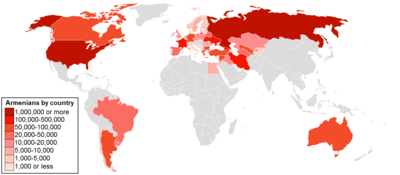Armenians in Pakistan
| Regions with significant populations | |
|---|---|
| Islamabad, Karachi, Lahore | |
| Languages | |
| Armenian and Urdu | |
| Religion | |
| Majority Christianity |
The Armenians in Pakistan are ethnic Armenians living in the present country of Pakistan. Armenians have settled various parts of South Asia and many migrated to Karachi during the economic boom in the early 20th century. Notable Armenian settlements in Pakistan can be found in the cities of Karachi, Lahore and in the capital Islamabad.
History
Armenian inscriptions from 1606 and 1618 have been found by archaeologists in 1901 in the Thal Chotiali, Loralai District, in Balochistan.[1][2] There was an Armenian colony established there in the beginning of the seventeenth century. In 1908, a British officer wrote that
No Armenian colonies could be traced in the Kalat Agency. We should therefore have to assume that the reputed settlers of the seventeenth century, on their conversion to Islam, have become completely merged in the indigenous Brahui and Baloch tribes.[3]
There was a fairly large Armenian colony in Lahore as early as the 16th century, in the time of the Mughal Empire.[4] Armenians prospered there, and while most were general merchants, members of the community were also noted as owners of breweries. There was a church in Lahore "used by Armenian Christian traders" under the Mughal Emperor Akbar.[5]
In 1711, there was a Bishop of the Armenian Church in Lahore.[6] However, many Armenians, including twenty merchants with their families, fled from the city after a Mughul governor threatened them. The community of the 17th and 18th centuries was greatly reduced, but with the arrival of British India, an Armenian presence continued in this part of the South Asia until the early 20th century. In 1907, the remaining Armenians in Lahore were visited by Armenian Archbishop Sahak Ayvadian, a primate of the Indian Diocese in Calcutta.[7]
See also
References
- ^ Percy Brown, Lahore Museum (Pakistan). A descriptive guide to the Department of archaeology & antiquities, 1908, p.25
- ^ Jean Philippe Vogel, “Armenian inscriptions in Baluchistan”, Archaeological Survey of India, 1904
- ^ Hughes R. Bullier, Baluchistan District Gazetter, Series Kharan Vol-VII, 1907
- ^ Jacob Seth Mesrovb, Armenians in India - From the Earliest Times to the Present, Calcutta, 1937, "Armenians at Lahore" p.201-206 (digitalized)
- ^ Theodore P. C. Gabriel, Christian Citizens in an Islamic State: The Pakistan Experience, Ashgate Publishing, Ltd., 2007, p.10 ISBN 9780754660361
- ^ Annie Basil, Armenian Settlements in India: from the earliest times to the present day, Calcutta, Armenian College, 1969, p.63, quoted in: Naira Mkrtchyan, “Indian Settlement in Armenia and Armenian Settlements in India and South Asia Archived February 23, 2012, at the Wayback Machine”, Indian Historical Review July 2005 32: 64-87, doi:10.1177/037698360503200204
- ^ Details about the Armenian community of Lahore on Chater Genealogy site[permanent dead link]

